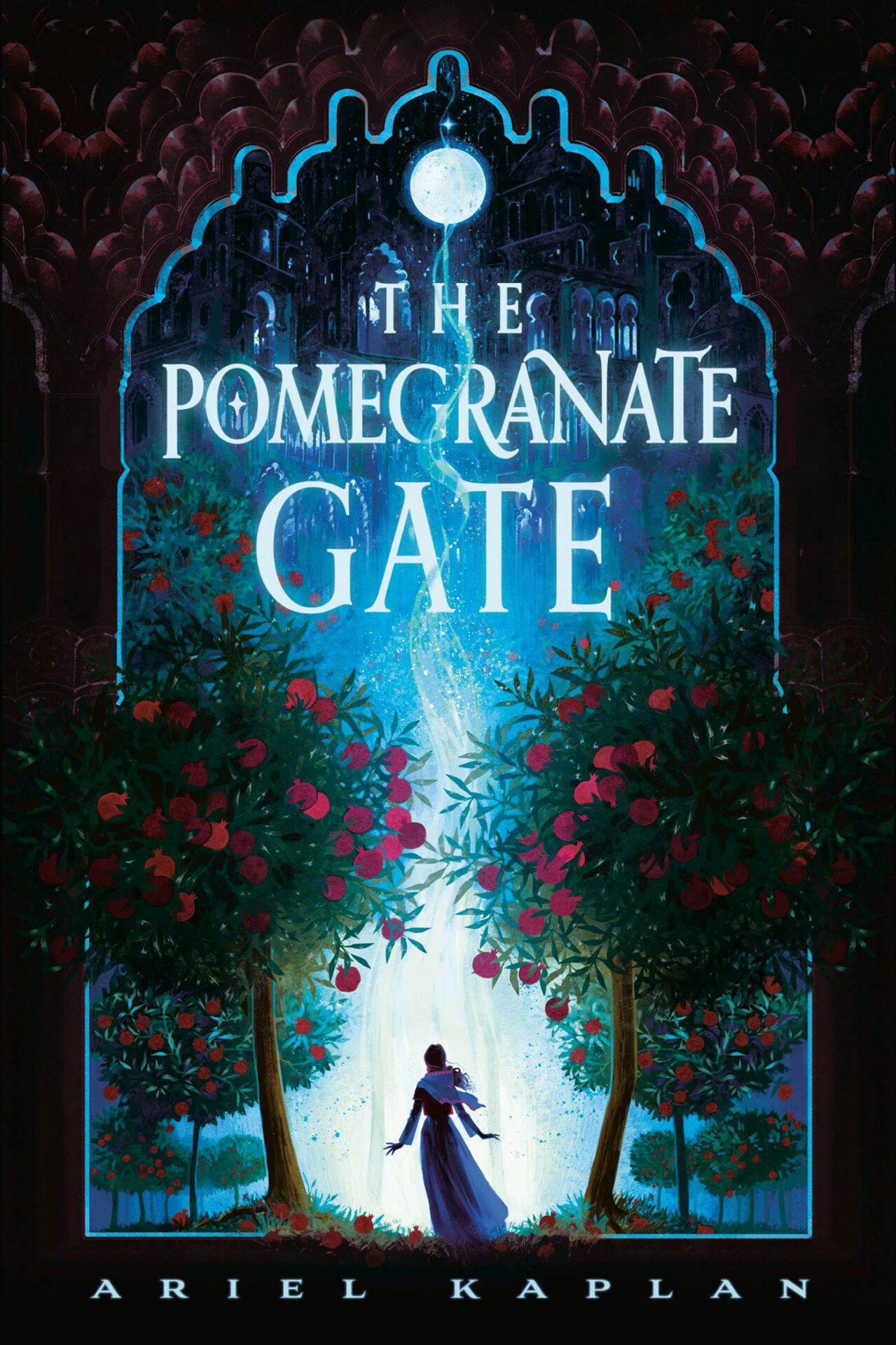
Ariel Kaplan is joining us today to talk about her novel, The Pomegranate Gate. Here’s the publisher’s description:
The first adventure in the Mirror Realm Cycle, a Spanish Inquisition-era fantasy trilogy inspired by Jewish folklore, with echoes of Naomi Novik and Katherine Arden.
Toba Peres can speak, but not shout; sleep, but not dream. She can write with both hands at once, in different languages, but she keeps her talents hidden at her grandparents’ behest. Naftaly Cresques sees things that aren’t real, and dreams things that are. Always the family disappointment, Naftaly would still risk his life to honor his father’s last wishes.
After the Queen demands every Jew convert or face banishment, Toba and Naftaly are among thousands of Jews who flee their homes. Defying royal orders to abandon all possessions, Toba keeps an amulet she must never take off; Naftaly smuggles a centuries-old book he’s forbidden to read. But the Inquisition is hunting these particular treasures-and they’re not hunting alone.
Toba stumbles through a pomegranate grove into the mirror realm of the Mazik: mythical, terrible immortals with an Inquisition of their own, equally cruel and even more powerful. With the Mazik kingdoms in political turmoil, this Inquisition readies its bid to control both realms.
In each world, Toba and Naftaly must evade both Inquisitions long enough to unravel the connection between their family heirlooms and the realm of the Mazik. Their fates are tied to this strange place, and it’s up to them to save it.
Brimming with folkloric wonder, The Pomegranate Gate weaves history and magic into a spellbindingly intricate tale suffused with humor and heart.
What’s Ariel’s favorite bit?

Ariel Kaplan
I have always found old ladies to be somewhat aspirational, both for their accrual of life experience and their journey to utter self-possesedness. They’ve seen stuff, and they’ll tell you about it, in the most unsanitized terms possible.
So one of the most enjoyable parts of working on The Pomegranate Gate was writing the stories of not just one old lady, but two: Elena, the grandmother of Toba, one of the main protagonists, and a beggar known only as the old woman, who has followed our other protagonist, Naftaly, throughout his adventures somewhat by accident.
In the original outline for The Pomegranate Gate, Elena goes on with her husband to Pengoa early in the story and is never seen again. But as I was writing, it became very clear to me that a woman who had worked as hard as she had to keep her rather strange granddaughter alive was not likely to accept her wandering through a mystical portal without doing anything to get her back. Instead, Elena steals a donkey and goes after Toba, which is probably the least questionable thing she does to save Toba from the Maziks.
Including the perspectives of women who have already lived a long life allowed for a fuller narrative beyond the stories of the two younger main characters. Elena and the old woman are too old to have been sheltered the way that Naftaly and Toba have been; they understand the world in a way twenty-somethings don’t yet, and they’re too careworn to share their youthful idealism. They’re also very aware, though, that they’re nearing the end of their lives, and that allows for a certain brand of selflessness, too.
Here is one of my favorite passages, from the perspective of the old woman (admittedly, this is slightly spoilery, so read on with that knowledge):
She’d never had children of her own; she’d been unhappy about it in her younger days, but then when the mob showed up and burned nearly every Jew in Savirra, including her third husband, her parents, and every other person she’d ever cared about, she’d been glad. If she’d had children, they’d have been burned, too, and she wasn’t sure how she’d have survived that.
So she wasn’t entirely unsympathetic to Elena, who’d lost sight of what was right in a desperate attempt to save her grandchild. Still, though, neither had she entirely forgiven her. The old woman was good at holding two opposing ideas in her hands at once; it was the best part, she thought, of being old.
The old woman hadn’t escaped Savirra because she was clever, or good, or wise, or rich. She’d escaped because she’d been lucky. Only it hadn’t felt much like luck, then, walking all the way to Rimon alone because she had no place else to go and no one to ask for help. It hadn’t felt much like luck when she was able to beg for a meal and a place to sleep.
She watched as those in front of her had their things searched. Naftaly had their remaining money; they wouldn’t need it for the ship, anyway, and they had no jewelry, or books, or anything else the Inquisition might have a hankering for. They stepped up, and the guard took one look at them, and wrinkled his nose—not wanting to put his hands on two old crones—and simply waved them through.
The old woman shook her head to herself. If she’d had Naftaly’s book, she could have gone right through with it.
All that was left now was to get on the ship.
There were children on the dock, weeping. A matron with her own children went to them and asked what in the world was the matter.
There were three of them, and the eldest told her they’d been separated from their parents; two of them were siblings, and the third they’d just found alone. They did not know if their families had gone ahead on another ship, or what had become of them.
Elena was by then hardly able to stand, and the old woman could barely manage her at all. The matron speaking to the children did not seem to know what to do, either. “Come with us,” she told them. “We’ll sort it out in Anab.”
From the ship, a man called out and pointed at the line of people, several back from where the old woman and Elena were standing. “What is he saying?” asked the woman behind her, and her husband replied, “He’s cutting off the line there. No more space on the ship.”
No one said, “Good thing we got here early,” or “thank goodness,” or anything like that, because of how awful it was to even think it: thank goodness I am safe, and not one of those others at the end of the line, who will have to make other arrangements tomorrow. Luck again, unearned.
“Will they send more ships?” someone asked.
“I don’t know.”
The old woman and Elena moved forward. She was so tired. In Anab, she thought, perhaps there would be a sunny spot where she could sit with a cat on her lap.
The matron speaking to the abandoned children had gone back to her spot, because what could she do? Give them her spot, and send her own children to Anab alone? Leave her own children there in their place?
The oldest looked to be about ten or so; the others much younger.
The old woman thought of Naftaly, the most foolish person she’d ever met, and likely the kindest. His father had sheltered him too much, probably because he was afraid for the boy, with his visions and his Mazik dreams. It was certainly why he was such an unmitigated idiot, but it was also why he’d retained such a gentle temperament. So many she’d met believed that trials make you kinder, but really, they just wore away at your character, leaving you covered in quills and hard edges. Naftaly hadn’t a hard edge anyplace. He was as uncalloused a person as she’d ever known.
He would never find a way out of Sefarad his own. Probably he would wander around with that stupid book until someone murdered him.
Elena opened her eyes, and looked at the children, and looked at the old woman, and they exchanged a glance for several moments.
The old woman adjusted Elena on her shoulder and stepped out of line. To the eldest child, she said, “Can you carry one of these others on your back?”
It was a little girl, and she nodded.
The old woman said. “Then take them and go stand in that line there.”
The girl looked at her a minute, confused, and the old woman said, “Go.”
LINKS:
The Pomegranate Gate book link
BIO:
Ariel Kaplan grew up outside Washington, D.C., and spent most of her childhood reading fairy tales and mythology before settling on a deep love for Jewish folklore. She began studying the history of medieval Spain and the Convivencia while working on a Monroe Scholar project at the College of William & Mary, where she graduated with a degree in History and Religious Studies. She is the author of several books for younger readers. The Pomegranate Gate is her first fantasy novel.
